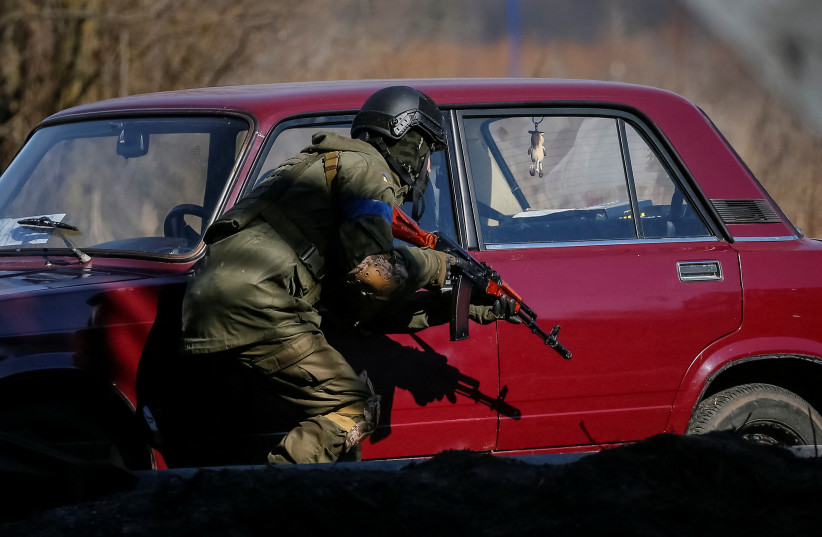The press is at war – again.
We have been there since the American Civil War, at which the Union and Confederacy arrived with a combined 373 daily newspapers, many of which covered the war intensely, often at close range. That is how the New York Tribune’s Irving Carson was killed while covering the Battle of Shiloh, and how James O’Neil, a battlefield illustrator for Frank Leslie’s Illustrated Newspaper, was killed at the Baxter Springs Massacre.
Numerous journalists have since been killed in multiple wars, from the New York Times’ Robert Post, who was covering Germany’s bombardment in 1943 from within a B-24 when it was shot down, or Israel Radio’s Ilan Roeh, whose vehicle hit a roadside bomb in south Lebanon in 1999.
The Ukraine War is no exception, having taken already in its first three weeks the lives of three journalists. Having said this, this war’s relationship with journalism actually is different, both technically and morally.
TECHNICALLY, covering this war is exceptionally difficult.

On the one hand, this is a clash between two big conventional armies in multiple arenas where fire exchanges are massive and continuous.
On the other hand, both militaries seem to have been caught off guard – the Ukrainians by the war’s outbreak and the Russians by its tactics. The result is chaotic war management, and news reporting that is mostly about local situations and seldom about the big picture, which both armies’ press operations either don’t fully know, or are unwilling to admit.
That is why it is difficult, for now, to construct basic facts like the locations, dates and paths of invading columns, and the number and types of armored brigades, infantry battalions and artillery batteries both sides deployed. Equally unclear is the Ukrainian guerrilla effort’s organization, if there is one.
Still, such issues get solved as wars evolve and the media, the armies and their press representatives all adapt. This cannot be said about journalism’s moral role in this war, which is no less dramatic than the diplomatic tizzy, economic mayhem, and refugee crisis it has caused.
THE PRESS did not win its place in the battlefield without a fight.
General William Sherman, for instance, distrusted the press, and once told a reporter: “You fellows make the best paid spies that can be bought” (H.J. Maihafer, War of Words: Abraham Lincoln and the Civil War Press, 2001). Charging that “newspaper spies” are “revealing each move, exaggerating our difficulties,” and thus preventing victory, he once arrested a journalist whose reporting he disliked.
The arrest sparked an outcry, and made rival newspapers hand Abraham Lincoln a petition demanding the reporter’s release. Lincoln indeed ordered the release, and also ruled that the battlefield will be open to the media’s coverage.
Russia’s Lincoln has yet to emerge, an absence that this week became glaring, when TV producer Marina Ovsyannikova, of Russian TV’s Channel One, emerged in a live broadcast behind a primetime show’s anchor displaying a handwritten sign. “No War,” it yelled. “Stop the war,” it demanded. “Don’t believe the propaganda,” it implored. “They are lying to you here,” it cried.
The 44-year-old mother of two managed to shout “Stop the war! No to war!” before the broadcast was cut off and she was whisked away, soon emerging in a courtroom where she was charged with organizing an unlicensed public event.
Realizing her bravery could only lead her message that far, Ovsyannikova prepared in advance a video she released on Telegram, where she said she was born to a Ukrainian father and a Russian mother.
“They were never enemies,” she said, and then told the Russian people that what they get in her channel is “Kremlin propaganda” that “turns Russians into zombies.” “Go protest,” she said, “don’t be afraid of anything, they can’t lock us all away.”
Having thus caught the entire world’s attention, including an asylum offer by French President Emmanuel Macron, Ovsyannikova was fortunate enough to be fined and released.
Even so, the hostility to journalism that she described, decried, and experienced, encapsulates what the Ukraine War is all about.
THIS WAR not only about what happened to Ovsyannikova, and not only about Ukraine’s independence; it’s also about what happened to journalism in post-Communist Russia, and the broader war on truth that it eventually spawned.
This war is also about Anna Politkovskaya, whose reports from Chechnya ended in 2006 with a bullet to her head in her apartment building’s elevator; it’s about the sudden death in 2003 of investigative reporter Yuri Shchekochikhin at age 53 while probing domestic-intelligence agents’ corruption; it’s about TV broadcaster Olga Kotovskaya, who fell to her death in 2009 from a 14th-floor window; it’s about Ivan Safronov, who fell from a fifth-floor window while investigating Russian arms exports. It’s about them and dozens of other Russian journalists who lost their lives while defying power and seeking the truth.
The extent to which the Russian government was directly involved in these deaths is unclear, and might never be known. What is clear is that the Kremlin has been fighting truth actively, consciously, and systematically, most brazenly in its effort to affect America’s presidential election through social-media manipulation.
“The hero of my story… is the truth,” wrote Leo Tolstoy in his Sevastopol in May, an anti-war account often seen as literature’s first experiment in war correspondence. None of the uniformed men that Tolstoy described, as they killed other uniformed men, was a hero, he insisted, thus summarizing the senselessness of the Crimean War, a collision over imperial power, turf and prestige.
The Ukraine War is not senseless, and it does have heroes – from the leaders, soldiers and ordinary people who chose to fight a mighty invader, to journalists like Marina Ovsyannikova, who chose to dare authority, and shout the truth.
The writer’s bestselling Mitzad Ha’ivelet Ha’yehudi (The Jewish March of Folly, Yediot Sefarim, 2019), is a revisionist history of the Jewish people’s leadership from antiquity to modernity.
